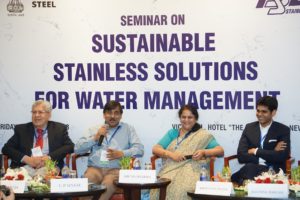by Suman Gupta
 August, 2018, New Delhi: A national seminar on ‘Sustainable Stainless Steel Solutions for Water Management’ was organized in Delhi today by Indian Stainless Steel Development Association (ISSDA), the apex body of the stainless steel industry. The seminar deliberated on sustainable infrastructural solutions for the growing issue of safe water management with OEMs and policymakers. Opening the event, Abhyuday Jindal, Managing Director, Jindal Stainless said, “The Delhi Jal Board loses 48% of treated water. A significant reason for that is attributed to leaky pipelines, which in turn also contaminates the water through harmful pathogens entering the water supply. A Water Aid report estimates that more than 500 children under the age of five die each day from diarrhoea in India alone. To stop this loss of life and finances, it is pertinent that we switch to stainless steel for integrated water management – for treatment, storage, transmission and waste water management. Since the metal is inherently corrosion-resistant and requires minimal maintenance, it’s an optimum choice for water management.”
August, 2018, New Delhi: A national seminar on ‘Sustainable Stainless Steel Solutions for Water Management’ was organized in Delhi today by Indian Stainless Steel Development Association (ISSDA), the apex body of the stainless steel industry. The seminar deliberated on sustainable infrastructural solutions for the growing issue of safe water management with OEMs and policymakers. Opening the event, Abhyuday Jindal, Managing Director, Jindal Stainless said, “The Delhi Jal Board loses 48% of treated water. A significant reason for that is attributed to leaky pipelines, which in turn also contaminates the water through harmful pathogens entering the water supply. A Water Aid report estimates that more than 500 children under the age of five die each day from diarrhoea in India alone. To stop this loss of life and finances, it is pertinent that we switch to stainless steel for integrated water management – for treatment, storage, transmission and waste water management. Since the metal is inherently corrosion-resistant and requires minimal maintenance, it’s an optimum choice for water management.”
The event was organized under the aegis of Ministry of Steel. Addressing the gathering, Secretary (Steel) Dr Aruna Sharma said, “As second largest stainless steel producer in the world, India is a point in time when it becomes mandatory to use stainless steel in water management. In a panel discussion during the event, Secretary, Union Ministry of Water Resources, Mr UP Singh said, “The health costs of impure water are too high, and it therefore merits that we have an inter-departmental discussion among related Secretaries to deliberate over this.”
“Water leakage and water contamination are major issues which cause huge loss of valuable natural resources and precious lives as well. ISSDA has been working tirelessly to promote stainless steel because it has proven to be the ideal material to ensure safety and purity of water across the world,” said President of ISSDA, Mr KK Pahuja.
Water pipes made up of plastic and poor quality steel tend to leak or rust leading to the contamination of treated water. As per a Wateraid report, about 37.3 million lives are affected annually in India due to water borne-diseases. An integrated wastewater treatment plant can lead to reclamation, recycling and re-treating of water. World over, stainless steel is used for water management. Tokyo and Taipei, after the adoption of stainless steel in their water management system have saved nearly 37.5 billion and 38.6 billion of gallons of water respectively. Singapore has also dealt with water crisis by adopting stainless steel water treatment plants.
Delhi Jal Board is now adopting stainless steel tankers to transport water to ensure hygiene. Stainless Steel water ATMs are also being installed in many cities to maintain safe supply of water to all. ISSDA is actively working with the Ministry of Drinking Water, Ministry of Water Resources, Ministry of Health, Ministry of Housing and Urban Affairs to promote the use of stainless steel to ensure sustainable water management practices.
Other participants at the seminar included Joint Director & Nodal Officer, Vector Borne Diseases control Program, Ministry of Health & Family Welfare, Dr Kalpana Baruah and Additional Adviser, Ministry Of Drinking Water And Sanitation, Dr Dinesh Chand, among others.
About ISSDA:ISSDA is the apex body representing the stainless steel industry in India. Founded in 1989 by leading stainless steel producers, it was formed with the objective of diversifying the applications of stainless steel in India. The association currently has a membership of over 145 companies engaged in the stainless steel business.

